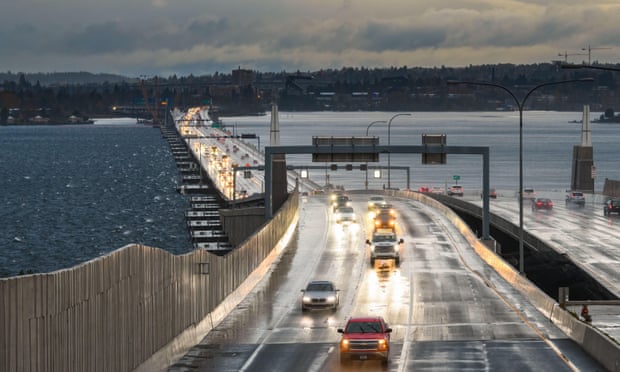Washington state to ban sales of new gas cars by 2035, following California
Public will have chance to weigh in on details of plan, with transportation accounting for 40% of state greenhouse gas emissions

Washington state will follow California and prohibit the sale of new gas-powered vehicles by 2035, Jay Inslee, the state governor, said.
California regulators on Thursday moved forward with a landmark plan to phase out the sale of gas cars over the next 13 years in the US’s largest auto market.
The new policy requires 100% of new sales of passenger cars, trucks and SUVs in the state to be powered by electricity or hydrogen by 2035, with one-fifth allowed to be plug-in hybrids.
The specific regulations for Washington state are yet to be created and the public will have the chance to weigh in, the Seattle Times reported.
Transportation-related emissions account for more than 40% of greenhouse gas emissions in Washington.
In 2020, lawmakers in the state passed a law directing the department of ecology to adopt California’s emissions standards. This year, they set a goal of phasing out sales of new internal combustion-powered cars by 2030.
A state council, set up by Inslee to plan for the future of electric vehicles, held its first meeting in July. Members discussed building a network of fast-charging stations on state highways, said Anna Lising, senior climate adviser to Inslee. The effort will be helped by $71m from the federal government.
The state legislature also has budgeted $69m to set up “community charging” stations for people who don’t live in single-family homes.
Lising said she expected the new regulations to incentivize manufacturers to make more and cheaper electric vehicles.
Nearly 20% of new vehicle registrations in Washington in July were either electric or hybrid, according to data from the state’s department of licensing. In total, 104,000 electric vehicles – either fully battery electric or a plug-in hybrid electric – are registered in the state, about 2.5 times the total from two years ago.
Massachusetts has also said it will follow California’s lead and more states are likely to. New York and Pennsylvania are among 17 states that have adopted some or all of California’s tailpipe emission standards, which are stricter than federal rules.
The policy passed in California on Thursday marks a dramatic step in the fight to reduce emissions and combat the climate emergency.
Implementing the new rules will require significant investments, however. California will need to expand public charging stations to accommodate the surge in electric vehicles.
The Alliance for Automotive Innovation, which represents many large carmakers, said meeting the state’s ambitious timeline would be challenging due to the lack of charging infrastructure, access to materials needed for batteries, and supply chain problems.
And even with the new rules, California’s transition to electric vehicles will take time as gas-powered cars will outnumber zero-emission vehicles for years.
In Washington, the Republican representative Andy Barkis, ranking member of the state house of representatives’ transportation committee, said he felt the push to ban internal combustion engines would hurt both manufacturers and consumers.
“I believe the market is best to continue to determine how we transition,” he said.